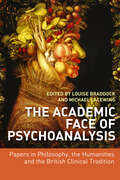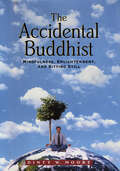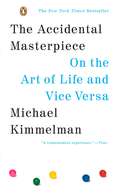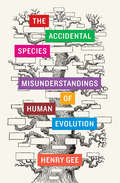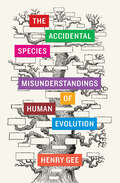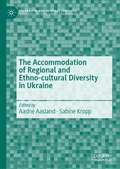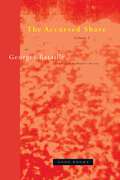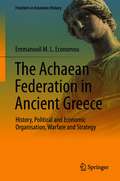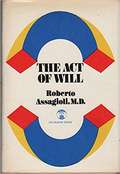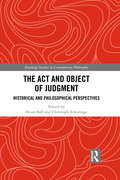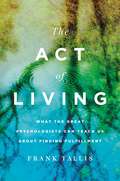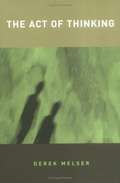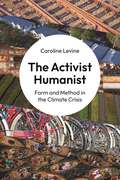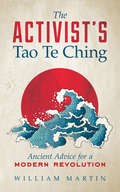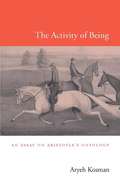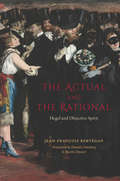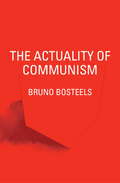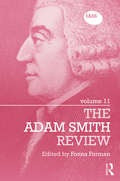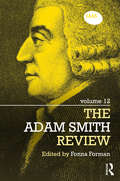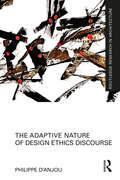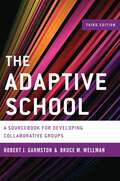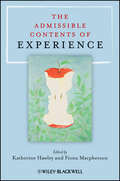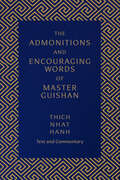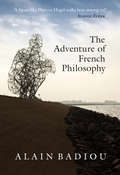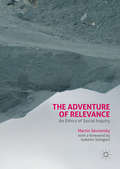- Table View
- List View
The Academic Face of Psychoanalysis: Papers in Philosophy, the Humanities, and the British Clinical Tradition
by Michael Lacewing Louise BraddockEver since Freud, psychoanalysts have explored the connections between psychoanalysis and literature and psychoanalysis and philosophy, while literary criticism, social science and philosophy have all reflected on and made use of ideas from psychoanalytic theory. The Academic Face of Psychoanalysis presents contributions from these fields and gives the reader an insight into different understandings and applications of psychoanalytic theory. This book comprises twelve contributions from experts in their fields covering philosophy, psychoanalysis, sociology and literary theory. The chapters are divided into three distinct sections: Psychoanalysis Philosophy Social science and literary theory Louise Braddock and Michael Lacewing successfully bring these contributions together with an in-depth introduction that allows the reader to explore the connections between the different disciplines. The multi-disciplinary approach to this book is rare; it will appeal to academics and students, from the subject areas of psychoanalysis, humanities and social science.
The Accidental Buddhist: Mindfulness, Enlightenment, and Sitting Still
by Dinty W. MooreA journey through the diverse landscape of American Buddhism, written with “a blessedly down-to-earth sense of humor” (Rodger Kamenetz, author of The Jew in the Lotus). In an era when many of us yearn for an escape from a culture of noise and narcissism, this book takes us into the physical and spiritual geography of Buddhism, American-style: from a weekend at a mountain retreat for corporate executives learning effective ways to cope with stress, to a visit with a Zen teacher holding classes in an old Quaker farmhouse, to a meeting with a Catholic priest who’s also a Zen master. Both a lively introduction to this Eastern spiritual tradition and a colorful portrait of American society, The Accidental Buddhist “makes the oftentimes impenetrable concepts of Buddhism accessible to the reader and contains striking, and important, parallels and contrasts between [the author’s] own Catholic upbringing and ancient Buddhist traditions” (Library Journal). “A travelogue detailing the tremendous diversity within American Buddhism. His anecdotes make it clear that the umbrella term ‘Buddhist’ encompasses strict Zen monks, laid-back Tibetan politicos, and beatnik holdover Allen Ginsberg. In his travels, Moore attends weekend retreats, chronicles the Dalai Lama’s 1996 visit to Indiana, and grooves to Change Your Mind Day, a meditative Buddha-fest in New York City’s Central Park. . . . He finds that his family is his sangha (monastery), and while he still feels he is ‘probably a fairly lousy Buddhist,’ he will eclectically combine his various forms of new knowledge to find a path that makes sense to him. Now that may be an authentic American Buddhism.” —Kirkus Reviews
The Accidental Masterpiece: On the Art of Life and Vice Versa
by Michael KimmelmanA New York Times bestseller—a dazzling and inspirational survey of how art can be found and appreciated in everyday lifeMichael Kimmelman, the prominent New York Times writer and a regular contributor to The New York Review of Books, is known as a deep and graceful writer across the disciplines of art and music and also as a pianist who understands something about the artist's sensibility from the inside. Readers have come to expect him not only to fill in their knowledge about art but also to inspire them to think about connections between art and the larger world - which is to say, to think more like an artist. Kimmelman's many years of contemplating and writing about art have brought him to this wise, wide-ranging, and long-awaited book.It explores art as life's great passion, revealing what we can learn of life through pictures and sculptures and the people who make them. It assures us that art - points of contact with the exceptional that are linked straight to the heart - can be found almost anywhere and everywhere if only our eyes are opened enough to recognize it. Kimmelman regards art, like all serious human endeavors, as a passage through which a larger view of life may come more clearly into focus. His book is a kind of adventure or journey.It carries the message that many of us may not yet have learned how to recognize the art in our own lives. To do so is something of an art itself. A few of the characters Kimmelman describes, like Bonnard and Chardin, are great artists. But others are explorers and obscure obsessives, paint-by-numbers enthusiasts, amateur shutterbugs, and collectors of strange odds and ends. Yet others, like Charlotte Solomon, a girl whom no one considered much of an artist but who secretly created a masterpiece about the world before her death in Auschwitz, have reserved spots for themselves in history, or not, with a single work that encapsulates a whole life.Kimmelman reminds us of the Wunderkammer, the cabinet of wonders - the rage in seventeenth-century Europe and a metaphor for the art of life. Each drawer of the cabinet promises something curious and exotic, instructive and beautiful, the cabinet being a kind of ideal, self-contained universe that makes order out of the chaos of the world. The Accidental Masterpiece is a kind of literary Wunderkammer, filled with lively surprises and philosophical musings. It will inspire readers to imagine their own personal cabinet of wonders.
The Accidental Species: Misunderstandings of Human Evolution
by Henry GeeThe idea of a missing link between humanity and our animal ancestors predates evolution and popular science and actually has religious roots in the deist concept of the Great Chain of Being. Yet, the metaphor has lodged itself in the contemporary imagination, and new fossil discoveries are often hailed in headlines as revealing the elusive transitional step, the moment when we stopped being “animal” and started being “human. ” In The Accidental Species, Henry Gee, longtime paleontology editor at Nature, takes aim at this misleading notion, arguing that it reflects a profound misunderstanding of how evolution works and, when applied to the evolution of our own species, supports mistaken ideas about our own place in the universe. Gee presents a robust and stark challenge to our tendency to see ourselves as the acme of creation. Far from being a quirk of religious fundamentalism, human exceptionalism, Gee argues, is an error that also infects scientific thought. Touring the many features of human beings that have recurrently been used to distinguish us from the rest of the animal world, Gee shows that our evolutionary outcome is one possibility among many, one that owes more to chance than to an organized progression to supremacy. He starts with bipedality, which he shows could have arisen entirely by accident, as a by-product of sexual selection, moves on to technology, large brain size, intelligence, language, and, finally, sentience. He reveals each of these attributes to be alive and well throughout the animal world—they are not, indeed, unique to our species. The Accidental Species combines Gee’s firsthand experience on the editorial side of many incredible paleontological findings with healthy skepticism and humor to create a book that aims to overturn popular thinking on human evolution—the key is not what’s missing, but how we’re linked.
The Accidental Species: Misunderstandings of Human Evolution
by Henry Gee“With a delightfully irascible sense of humor, Henry Gee reflects on our origin . . . an excellent primer on how—and how not—to think about human evolution.” —Carl Zimmer, author of Parasite RexThe idea of a missing link between humanity and our animal ancestors predates evolution and popular science and actually has religious roots in the deist concept of the Great Chain of Being. Yet, the metaphor has lodged itself in the contemporary imagination, and new fossil discoveries are often hailed in headlines as revealing the elusive transitional step, the moment when we stopped being “animal” and started being “human.” In The Accidental Species, Henry Gee, longtime paleontology editor at Nature, takes aim at this misleading notion, arguing that it reflects a profound misunderstanding of how evolution works and, when applied to the evolution of our own species, supports mistaken ideas about our own place in the universe.Gee presents a robust and stark challenge to our tendency to see ourselves as the acme of creation. Far from being a quirk of religious fundamentalism, human exceptionalism, Gee argues, is an error that also infects scientific thought. Touring the many features of human beings that have recurrently been used to distinguish us from the rest of the animal world, Gee shows that our evolutionary outcome is one possibility among many, one that owes more to chance than to an organized progression to supremacy. He starts with bipedality, which he shows could have arisen entirely by accident, as a by-product of sexual selection, then moves on to technology, large brain size, intelligence, language, and, finally, sentience. He reveals each of these attributes to be alive and well throughout the animal world—they are not, indeed, unique to our species.The Accidental Species combines Gee’s expertise and experience with healthy skepticism and humor to create a book that aims to overturn popular thinking on human evolution. The key is not what’s missing—but how we’re linked.
The Accommodation of Regional and Ethno-cultural Diversity in Ukraine (Federalism and Internal Conflicts)
by Sabine Kropp Aadne AaslandThe book offers new insights into how ethnicity, language and regional-local identity interact within the context of Ukrainian political reform, and indicates how these reforms affect social cohesion among ethno-cultural groups. While the individual chapters each focus on one or a few facets of the overall research question, together they draw a nuanced picture of the multifaceted challenges to creating and consolidating social cohesion in a nationalizing state. The concept integrates various disciplines, including political science, international relations, law, and sociology. Correspondingly, the contributions are based on various methodological approaches, ranging from legal analysis over media discourse analysis, individual and focus group interviews to analysis of data from a representative population survey. The findings of the in-depth study are discussed within the broader context of comparative research on diversity management and social cohesion in fragmented societies.
The Accursed Share, Volume I
by Georges BatailleFrom the acclaimed French philosopher, intellectual, and novelist, a brilliant account of the social and economic costs of civilizationIn this important work, Georges Bataille uses his novel economic theory as the basis for an incisive inquiry into the very nature of civilization. He introduces here his concept of the accursed share, the surplus energy that any system, natural or cultural, must expend; it is this expenditure, according to Bataille, that most clearly defines a society. His examples include sacrifice among the Aztecs, potlatch among the Northwest Coast Indians, military conquest in Islam, and Buddhist monasticism in Tibet.In this way, Bataille proposes a theory of a &“general economy&” based on excess and exuberance that radically revises conventional economic models of scarcity and utility. A brilliant blend of economics and aesthetics, ethics and anthropology, The Accursed Share provides an excellent introduction to Bataille&’s philosophic work. It will be of particular interest not only to readers of his fiction and essays but also to cultural theorists, anthropologists, and economists of all schools.
The Achaean Federation in Ancient Greece: History, Political and Economic Organisation, Warfare and Strategy (Frontiers in Economic History)
by Emmanouil M. EconomouThis book analyses ancient Greek federalism by focusing on one of the most organised and advanced Greek federal states, the Achaean Federation Sympoliteia. Unlike earlier studies that mainly focused on its political history, this book adopts an interdisciplinary approach, analysing aspects of the economic organization and institutions, and the political economy of the Achaean Federation, and combining these findings with political history. It also discusses the strategic choices made by significant historical figures such as generals Aratos and Philopoemen. The analysis of the Achaean Federation verifies the intertemporal federal axiom, which states that the success and viability of federal experiment is achieved when the benefits of participation for the member-states exceed the costs of conferring national sovereignty on supranational federal authorities.The book further argues that the Achaeans developed a system of sophisticated direct democratic procedures in decision-making on federal matters, as well as significant and highly sophisticated (for the era) economic institutions and federal practices, in order to achieve bonds of trust and legitimacy regarding their innovative federal structure. These practices included, among others, the creation of free market type economic institutions, a monetary union, federal budget, provision of public goods and a common defense and security policy for all the Achaean city-state members. Lastly, the book relates these findings to ideas on how the Achaean Federation would have dealt with a series of current global issues, such as European Union integration and problems such as Euroscepticism, Brexit and immigration.
The Act Of Will
by Roberto AssagioliThis unique book brings human will back to the center of everyday life. Here there is none of the old notion of will as "something stern and forbidding which condemns and represses... the personality drives." Instead, Dr. Roberto Assagioli defines the will as a constructive force guiding intuition, impulse, emotion, and imagination toward complete realization of the self. He proposes a set of exercises that the reader can practice at home and that train the will for "optimum use at all levels of existence - from the personal to the transpersonal and reaching into the realm where the individual will merges with the universal will."
The Act and Object of Judgment: Historical and Philosophical Perspectives (Routledge Studies in Contemporary Philosophy)
by Brian Ball Christoph SchuringaThis book presents 12 original essays on historical and contemporary philosophical discussions of judgment. The central issues explored in this volume can be separated into two groups namely, those concerning the act and object of judgment. What kind of act is judgment? How is it related to a range of other mental acts, states, and dispositions? Where and how does assertive force enter in? Is there a distinct category of negative judgments, or are these simply judgments whose objects are negative? Concerning the object of judgment: How many objects are there of a given judgment? One, as on the dual relation theory of Frege and Moore? Or many as in Russell’s later multiple relation theory? If there is a single object, is it a proposition? And if so, is it a force-neutral, abstract entity that might equally figure as the object of a range of intentional attitudes? Or is it somehow constitutively tied to the act itself? These and related questions are approached from a variety of historical and contemporary perspectives. This book sheds new light on current controversies by drawing on the details of the distinct intellectual contexts in which previous philosophers’ positions about the nature of judgment were formulated. In turn, new directions in present-day research promise to raise novel interpretive prospects and challenges in the history of philosophy.
The Act of Living: What the Great Psychologists Can Teach Us About Finding Fulfillment
by Frank TallisLife and its meaning is a mystery almost impossible to solve, but what can the leading theories teach us about the search for purpose?For most of us, the major questions of life continue to perplex: Who am I? Why am I here? How should I live? In the late nineteenth century, a class of thinkers emerged who made solving these problems central to their work. They understood that human questions demand human answers and that without understanding what it means to be human, there are no answers.Through the biographies and theories of luminaries ranging from Sigmund Freud to Erich Fromm, Frank Tallis show us how to think about companionship and parenting, identity and aging, and much more. Accessible yet erudite, The Act of Living is essential reading for anyone seeking answers to life's biggest questions.
The Act of Thinking
by Derek MelserMelser argues that the core assumption of both folk psychology and cognitive science that thinking goes on in the head is mistaken. He argues that thinking is not an intracranial process of any kind, mental or neural, but is rather a learned action of the person.
The Activist Humanist: Form and Method in the Climate Crisis
by Caroline LevineAn argument that humanists have the tools—and the responsibility—to mobilize political power to tackle climate changeAs climate catastrophes intensify, why do literary and cultural studies scholars so often remain committed to the separation of aesthetic study from the nitty-gritty of political change? In this thought-provoking book, Caroline Levine makes the case for an alternative view, arguing that humanists have the tools to mobilize political power—and the responsibility to use those tools to avert the worst impacts of global warming. Building on the theory developed in her award-winning book, Forms, Levine shows how formalist methods can be used in the fight for climate justice.Countering scholars in the environmental humanities who embrace only “modest gestures of care”—and who seem to have moved directly to “mourning” our inevitable environmental losses—Levine argues that large-scale, practical environmental activism should be integral to humanists’ work. She identifies three major infrastructural forms crucial to sustaining collective life: routines, pathways, and enclosures. Crisscrossing between art works and public works—from urban transportation to television series and from food security programs to rhyming couplets—she considers which forms might support stability and predictability in the face of growing precarity. Finally, bridging the gap between academic and practical work, Levine offers a series of questions and exercises intended to guide readers into political action. The Activist Humanist provides an essential handbook for prospective activist-scholars.
The Activist's Tao Te Ching: Ancient Advice for a Modern Revolution
by William MartinChange and anger are in the air. "We are the 99%," "black lives matter," and "love is love" have become part of the lexicon. Previously unquestioned institutions (police, military, the NSA) are under scrutiny. Heat waves, floods, and earthquakes seem to be increasing. Could there be a silver lining? William Martin turns to the Tao Te Ching and finds that while Taoism is known for its quiet, enigmatic wisdom, the Tao can also have the cleansing force of a rushing river. Martin elucidates these revolutionary messages condemning power seeking and greed. He emphasizes that humans have a "Te" that can help them heal the planet; shows how Taoism's "simplicity" can be subversive and its flexibility a potent force; and reassures us that "When injustice is the rule, justice lies in wait." Provocative and stirring, Martin's Tao flows within and through those who ride the waves of anger and frustration, "and gently guides [them] to true freedom."
The Activity of Being
by Aryeh KosmanUnderstanding “what something is” has long occupied philosophers, and no Western thinker has had more influence on the nature of being than Aristotle. Focusing on a reinterpretation of the concept of energeia as “activity,” Aryeh Kosman reexamines Aristotle’s ontology and some of our most basic assumptions about the great philosopher’s thought.
The Actual and the Rational: Hegel and Objective Spirit
by Jean-François KervéganOne of Hegel’s most controversial and confounding claims is that “the real is rational and the rational is real.” In this book, one of the world’s leading scholars of Hegel, Jean-François Kervégan, offers a thorough analysis and explanation of that claim, along the way delivering a compelling account of modern social, political, and ethical life. ?Kervégan begins with Hegel’s term “objective spirit,” the public manifestation of our deepest commitments, the binding norms that shape our existence as subjects and agents. He examines objective spirit in three realms: the notion of right, the theory of society, and the state. In conversation with Tocqueville and other theorists of democracy, whether in the Anglophone world or in Europe, Kervégan shows how Hegel—often associated with grand metaphysical ideas—actually had a specific conception of civil society and the state. In Hegel’s view, public institutions represent the fulfillment of deep subjective needs—and in that sense, demonstrate that the real is the rational, because what surrounds us is the product of our collective mindedness. This groundbreaking analysis will guide the study of Hegel and nineteenth-century political thought for years to come.
The Actuality of Communism
by Bruno BosteelsOne of the rising stars of contemporary critical theory, Bruno Bosteels discusses the new currents of thought generated by figures such as Alain Badiou, Jacques Rancière and Slavoj i ek, who are spearheading the revival of interest in communism. Bosteels examines this resurgence of communist thought through the prism of "speculative leftism" - an incapacity to move beyond lofty abstractions and thoroughly rethink the categories of masses, classes and state. Debating those questions with writers including Roberto Esposito and Alberto Moreiras, Bosteels also provides a vital account of the work of the Bolivian Vice President and thinker Álvaro García Linera.From the Hardcover edition.
The Adam Smith Review: Volume 11 (The Adam Smith Review #11)
by Fonna FormanAdam Smith’s contribution to economics is well recognised, but scholars have recently been exploring anew the multidisciplinary nature of his works. The Adam Smith Review is a rigorously refereed annual review that provides a unique forum for interdisciplinary debate on all aspects of Adam Smith’s works, his place in history, and the significance of his writings to the modern world. It is aimed at facilitating debate between scholars working across the humanities and social sciences, thus emulating the reach of the Enlightenment world which Smith helped to shape. This eleventh volume brings together leading scholars from across several disciplines, and offers a particular focus on Smith and Rousseau. There is also an emphasis throughout the volume on the relationship between Smith’s work and that of other key thinkers such as Malthus, Newton, Freud and Sen.
The Adam Smith Review: Volume 12 (The Adam Smith Review #12)
by Fonna FormanAdam Smith’s contribution to economics is well recognised, yet scholars have recently been exploring anew the multidisciplinary nature of his works. The Adam Smith Review is a rigorously refereed annual review that provides a unique forum for interdisciplinary debate on all aspects of Adam Smith’s works, his place in history, and the significance of his writings to the modern world. It is aimed at facilitating debate among scholars working across the humanities and social sciences, thus emulating the reach of the Enlightenment world which Smith helped to shape. This twelfth volume brings together leading scholars from across several disciplines and contributes to two particular themes. First, there is a focus on Adam Smith’s moral and political philosophy, exploring how Smith’s approach finds expression in both abstract philosophy and practical judgment. Second, there is a focus on epistemology, economics, and law, with innovative interpretations of Smithian theories.
The Adaptive Nature of Design Ethics Discourse (Routledge Research in Architecture)
by Philippe d’AnjouHow do designers navigate the ethical discursive territories of design thinking and practice when the same common terms they consistently use across the different design ethics paradigms—like fair, right, good—convey different meanings? Delving into the dynamic and adaptable nature of ethical language and terminology in design, The Adaptive Nature of Design Ethics Discourse argues that it is intrinsically flexible—what can be described as chameleonic. Engaging in a meta-ethical investigation, this book elucidates the interconnections of key terms of design ethics discourse and explores the way in which different frameworks of design ethics both diverge and intersect.The book challenges existing perspectives on ethical discourse in design by highlighting the complexities of such discourse and the tensions that emerge when universal language encounters various ethical views. By shedding light on these tensions, The Adaptive Nature of Design Ethics Discourse provides alternative ways to apprehend the ethical sense of responsibility of designers as well as a foundation for rethinking the discursive fabric of design ethics practice.This pivotal work is intended for researchers, educators, students, and practitioners across all design disciplines, including, among others, architecture, engineering, product design, systems design, and urban planning.
The Adaptive School: A Sourcebook For Developing Collaborative Groups (Christopher-gordon New Editions Ser.)
by Robert J. Garmston Bruce M. WellmanThis 3rd edition of the award winning Adaptive Schools Sourcebook provides both a theoretical and practical guide for groups and teams to develop and focus their collaborative energies to improve teaching practices and enhance student-learning outcomes. In five sections: Becoming Adaptive, Collaboration Matters, Meetings are Teachers’ Work, Resources for Inquiry, and Conflict, Change and Community, the authors draw on decades of personal experiences in schools and research from multiple disciplines to present powerful tools and useful templates for structuring the work of productive professional communities in schools. Readers will learn ways to develop and sustain the fundamental elements for enhancing social capital in schools: distinguishing between dialogue and discussion, establishing seven norms of collaboration, automating language patterns for inquiry and problem solving, facilitating groups and data teams, engaging in productive conflict, and building community. The book offers links to video clips demonstrating key skills, inventories for assessing groups, instruments for assessing personal skills, and a collection of over 150 meeting strategies and facilitator moves for engaging group members in productive interactions.
The Admissible Contents of Experience (Philosophical Quarterly Special Issues #2)
by Fiona Macpherson Katherine HawleyWhich objects and properties are represented in perceptual experience, and how are we able to determine this? The papers in this collection address these questions together with other fundamental questions about the nature of perceptual content. The book draws together papers by leading international philosophers of mind, including Alex Byrne (MIT), Alva Noë (University of California, Berkeley), Tim Bayne (St Catherine’s College, Oxford), Michael Tye (University of Texas, Austin), Richard Price (All Souls College, Oxford) and Susanna Siegel (Harvard University) Essays address the central questions surrounding the content of perceptual experience Investigates how are we able to determine the admissible contents of experience Published in association with the journal Philosophical Quarterly
The Admonitions and Encouraging Words of Master Guishan
by Thich Nhat HanhThich Nhat Hanh's translation and commentary for a Buddhist text that has been long considered one of the three key books for monastic meditation practitionersFor monks, nuns, or laypeople, this text from the days of early Buddhism in China calls on us to wake up and live an authentic life dedicated to spiritual ideals. The Admonitions and Encouraging Words of Master Guishan is offered to new monks and nuns at the time of their ordination together with books on monastic codes of conduct, and it remains a companion and guide throughout their career. The importance of Master Guishan's Classical Chinese text cannot be underestimated. Although it is addressed to monks, it is suitable for anyone who seeks to awaken and live with clarity and intention. Thich Nhat Hanh gives a timely commentary based on his lived experience of guiding several generations of monastic and lay students on their path of practice. The text and commentary have been translated from Vietnamese into English by Bhikshuni True Virtue (Sister Annabel Laity), Thich Nhat Hanh's first Western monastic disciple.
The Adventure of French Philosophy
by Alain BadiouThe Adventure of French Philosophy is essential reading for anyone interested in what Badiou calls the &“French moment&” in contemporary thought.Badiou explores the exceptionally rich and varied world of French philosophy in a number of groundbreaking essays, published here for the first time in English or in a revised translation. Included are the often-quoted review of Louis Althusser&’s canonical works For Marx and Reading Capital and the scathing critique of &“potato fascism&” in Gilles Deleuze and Félix Guattari&’s A Thousand Plateaus. There are also talks on Michel Foucault and Jean-Luc Nancy, and reviews of the work of Jean-François Lyotard and Barbara Cassin, notable points of interest on an expansive tour of modern French thought.Guided by a small set of fundamental questions concerning the nature of being, the event, the subject, and truth, Badiou pushes to an extreme the polemical force of his thinking. Against the formless continuum of life, he posits the need for radical discontinuity; against the false modesty of finitude, he pleads for the mathematical infinity of everyday situations; against the various returns to Kant, he argues for the persistence of the Hegelian dialectic; and against the lure of ultraleftism, his texts from the 1970s vindicate the role of Maoism as a driving force behind the communist Idea.
The Adventure of Relevance
by Martin SavranskyAt a time where the relevance of the social sciences is under threat, this innovative book offers a speculative experimentation on the philosophy and methodology of the social sciences to rethink what 'relevance' is, and to cultivate a new ethos of knowledge-making for an eventful world. Engaging a diverse a range of thinkers including Alfred North Whitehead, Gilles Deleuze and Isabelle Stengers, as well as the American pragmatists John Dewey and William James, Martin Savransky challenges longstanding assumptions in the social sciences and argues that relevance is an event that is part and parcel of the immanent and situated processes by which things come to matter. He develops new conceptual tools for cultivating an empiricist ethos of inquiry that is attuned to the question of how things come to matter- an ethics that turns social inquiry into a veritable adventure. The result is an original and rigorous book that infuses knowledge-practices in the social sciences with new sensibilities, creative possibilities, and novel habits of thinking, knowing, and feeling.
